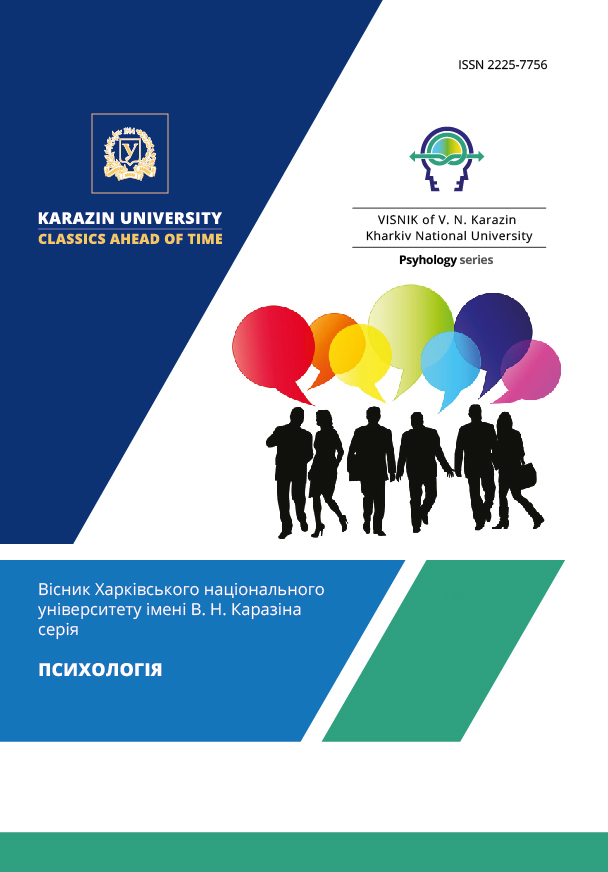The Relationship of Emotional Burnout and Personality Characteristics of Teachers
Abstract
The article presents the results of an empirical study devoted to the study of the relationship between emotional burnout and personal characteristics of teachers. The subjects included 60 teachers of different age and work experience. It is proved that in the group of teachers with experience of 3-10 years high results were obtained on the scales of communicative speed and intellectual emotionality, and the group of teachers with experience of 11-30 years were found at a higher level of formation on the scales of resistance phase, emotional symptoms -moral disorientation, reduction of professional responsibilities, psychosomatic, psychovegetative disorders, intellectual ergism and control scale than in the group of teachers with 3-10 years of experience. The most pronounced component of the emotional burnout syndrome in the general sample is depersonalization, which is manifested in the deformation of interpersonal contacts with the environment in the form of increasing negativity towards them. A statistically significant positive correlation was found in the overall subjects between the variables of emotional burnout such as stress phase, emotional exhaustion, reduction of personal achievements with such variables of personality traits as communicative emotionality, indices of general emotionality and general activity. In other words, the higher the level of personality traits, the better teachers prevent the occurrence of emotional burnout. There were shown negative correlations in the general in subjects studied between such variables of emotional burnout syndrome as stress phase, symptom of traumatic circumstances, symptom of personal alienation, emotional exhaustion with such variables of personality traits as communicative ergicness and intellectual speed. Negative psychological manifestations of emotional burnout in teachers, such as increased irritability, decreased self-control which leads to professional destruction, deformation, crises, stress and other negative formations were found. The obtained results can be used in the practical work of a psychologist with teachers.
Downloads
References
AbuMadini, M.S, Sakthivel, M. (2018). Comparative study to determine the occupational stress level and professional burnout in special school teachers working in private and government schools. Global Journal of Health Science, 10(3), 42–53. https://doi.org/10.5539/gjhs.v10n3p42.
Вeshchuk-Venherska, N.V. (2015). Prevention of burnout in teachers. Vinnytsa: ММК. https://dorobok.edu.vn.ua/article/pdf/1257
Chernobrovkin, V.M. (2012). Psychological features of problem situations of pedagogical activity. Problems of modern psychology, 2, 41–46. http://nbuv.gov.ua/UJRN/pspz_2012_2_10.
De Stasio, S., Fiorilli, C., Benevene, P. (2017). Burnout in special needs teachers at kindergarten and primary school: Investigating the role of personal resources and work wellbeing. Psychology in the Schools, 54(5), 472–486. https://doi.org/10.1002/ pits.22013
Gluschkoff, K., Elovainio, M., Kinnunen, U. (2016). Work stress, poor recovery and burnout in teachers. Occupational Medicine, 66(7), 564–570. https://doi.org/10.1093/occmed/kqw086
Hemati Alamdarloo, G., Moradi, S. (2021). Job Burnout in Public and Special School Teachers. Clinical Psychology and Special Education, 10(2), 63–75. https://doi.org/10.17759/cpse.2021100205
Kirieieva L.R. (2011). Theoretical analysis of the problem of emotional burnout of a teacher in the process of his professional development. Visnyk natsionalnoho universytetu oborony Ukrainy, 5, 135–140.
Koltunovich, T.A. (2016). Psychological conditions of correction of professional burnout in educators of children's educational institutions. (Master's thesis). Prikarpats'kij nacіonal'nij unіversitet іmenі Vasilya Stefanika, Іvano-Frankіvs'k.
Koutsimani, P., Montgomery, A., Georganta, K. (2019). The Relationship Between Burnout, Depression, and Anxiety: A Systematic Review and Meta-Analysis. Frontiers in Psychology. https://doi.org/10.3389/fpsyg.2019.00284.
Küçüksüleymanoglu, R. (2011). Burnout syndrome levels of teachers in special education schools in Turkey. International Journal of Special Education, 26(1), 53–63.
Maliar-Hazda, N.M. (2015). Emotional burnout is an urgent problem of medicine today. Problems of clinical pediatrics, 29, 27–31. http://nbuv.gov.ua/UJRN/pkp_2015_3_6
Mukundan, J., Ahour, T. (2011). Burnout among female teachers in Malaysia. Journal of International Education Research (JIER), 7(3), 25–38. https://doi.org/10.19030/jier.v 7i3.4972.
Perepeliuk, T.D., Kudelia, I.S. (2019). Psychological features of professional burnout of a high school teacher. Actual problems of psychology: Collection of scientific works of the institute of psychology named after GS Kostyuk NAPS of Ukraine ХІ (19), 381 395. http://appsychology.org.ua/data/jrn/v11/i19/25.pdf
Pohribna, A. O. (2017). Protective-coping behavior as a factor of emotional burnout of teachers of boarding schools for children with intellectual disabilities. (Master's thesis). Donbas State Pedagogical University, Slavyansk.
Popov, S., Latovljev, M., Nedić, A. (2015). Burnout in health care and education workers: The role of situational and individual factors. Psychological Research, 18(1), 5-22. https://doi.org/10.5937/PsIstra1501005P.
Shpychak, I.P. (2017). Prevention of emotional burnout of teachers: a special course. Rivne: ROIPPO.
Williams, J., Dikes, C. (2015). The implications of demographic variables as related to burnout among a sample of special education teachers. Education, 135(3), 337–345. https://eric.ed.gov/?id=EJ1095411
Citations
Emotional burnout of Ukrainian teachers in the context of a full-scale invasion
Tkachenko Vadim, Prysiazhniuk Yurii, Verkhovenko Olha & Nenko Yuliia (2024) Revista Brasileira de Educação do Campo
Crossref




